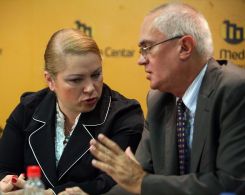- Serbia
Get to know Serbia
- Citizens
Culture and science
Health services
Pension and disability insurance
- Business
Employment
Economy
- Media
- Government
- Contact
Keep in touch
Contact form
Back
Keepin touch
Whether you have a question, comment, suggestion or any problem in the purview of the government, send us your message and we will try to respond as soon as possible. If your problem is not in our purview, we will forward your message to the relevant institution.
Q:
A:
Increasing transparency of public administration through availability of information on Internet
Belgrade,
17 September 2010
Minister of Telecommunications and Information Society Jasna Matic announced today that a by-law obliging all state organs to have a website with correct and updated information will be adopted by the end of the year.
Speaking at a press conference at which results of a survey on freshness of information on the webpages of state organs were presented, Matic said that this will boost the efficiency of the administration and reduce costs to companies.
Also, she said that a law that will regulate this field in all areas will be passed next year.
Director of Transparency Serbia Nemanja Nenadic, who presented results of the survey, said that state organs in Serbia do not use Internet enough and voiced hope that measures will be taken soon to correct this.
He said that the survey showed that some state bodies do not have on their websites the document outlining their jurisdiction and competencies, although that is required by law, and that none of such documents that appear on the websites contain full information.
The state organs either had no information at all about execution of their last year’s budget, or such information was incomplete, Nenadic pointed out.
Many state bodies did not change links that refer to .yu domain, and the survey also showed that the concept of electronic services is on a very low level.
The Director of Transparency Serbia said that the state bodies have little information on their websites about their future plans, and that their plans of work and reports are almost never put on the Internet.
UN Resident Coordinator in Serbia William Infante said that the use of information and communication technologies improves efficiency of work, increases transparency and save time and money, and that the electronic administration reduces corruption through simplification and depersonalisation of rules and procedures.
Commissioner for Information of Public Interest Rodoljub Sabic said that there is no better way to increase citizens’ trust in state organs than by increasing transparency of their work.
The Ministry of Telecommunications and Information Society carried out this survey in association with the UNDP in July 2010, on the sample of 21 institutions.
Also, she said that a law that will regulate this field in all areas will be passed next year.
Director of Transparency Serbia Nemanja Nenadic, who presented results of the survey, said that state organs in Serbia do not use Internet enough and voiced hope that measures will be taken soon to correct this.
He said that the survey showed that some state bodies do not have on their websites the document outlining their jurisdiction and competencies, although that is required by law, and that none of such documents that appear on the websites contain full information.
The state organs either had no information at all about execution of their last year’s budget, or such information was incomplete, Nenadic pointed out.
Many state bodies did not change links that refer to .yu domain, and the survey also showed that the concept of electronic services is on a very low level.
The Director of Transparency Serbia said that the state bodies have little information on their websites about their future plans, and that their plans of work and reports are almost never put on the Internet.
UN Resident Coordinator in Serbia William Infante said that the use of information and communication technologies improves efficiency of work, increases transparency and save time and money, and that the electronic administration reduces corruption through simplification and depersonalisation of rules and procedures.
Commissioner for Information of Public Interest Rodoljub Sabic said that there is no better way to increase citizens’ trust in state organs than by increasing transparency of their work.
The Ministry of Telecommunications and Information Society carried out this survey in association with the UNDP in July 2010, on the sample of 21 institutions.
-
 Belgrade, 22 January 2025
Belgrade, 22 January 2025Egypt one of Serbia’s closest partners on international stage
-
 Belgrade, 9 July 2024
Belgrade, 9 July 2024Support for 104 associations in diaspora that preserve Serbian language, culture
-
 Belgrade, 15 April 2024
Belgrade, 15 April 2024Competition for StarTech grants open until 31 May
-
 Belgrade, 2 October 2023
Belgrade, 2 October 2023Serbia respects Resolution 1244 and will do everything to preserve peace
-
 Belgrade, 13 September 2023
Belgrade, 13 September 2023Day of Serbian Unity to be celebrated outside borders of Serbia, Republika Srpska for the first time
-
 Belgrade, 8 August 2023
Belgrade, 8 August 2023RSD 24.2m in state aid paid out to citizens affected by storm
-
 Belgrade, 17 June 2023
Belgrade, 17 June 2023Belgrade is doing everything to preserve peace in Kosovo and Metohija
-
 Belgrade, 15 June 2023
Belgrade, 15 June 2023Slovenia will continue to support Serbia on its way to EU
-
 Belgrade, 5 May 2023
Belgrade, 5 May 2023Emergency measures, tightening of conditions for possessing weapons
-
 Belgrade, 3 May 2023
Belgrade, 3 May 2023Three days of mourning in Serbia over tragedy at Vladislav Ribnikar primary school

